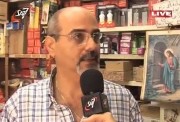 |
| (Photos courtesy SAT-7) |
Syria (SAT7/MNN) ― The United Nations gathered last week to try to come to some solution to the Syrian violence.
Even as the world's leaders puzzled over the lack of safe zones and supporting refugee camps, rebels kept the government forces occupied with a barrage of attacks in Aleppo, and the violence spilled over the border into Tripoli, Lebanon.
That led to requests for U.N. help from Turkey, Jordan, and Lebanon, which are bearing the brunt of the mounting refugee crisis.
SAT-7, a Christian satellite television ministry to the Middle East and North Africa, has studios in Beirut. "The condition in Lebanon is becoming more and more difficult for everybody. There aren't a lot of opportunities for young people," says Naji Daoud, Executive Director of the SAT-7 studio in Beirut. The unrest has added to the challenges facing the region, both acknowledged and answered by SAT-7.
About 30,000 Syrian refugees have flowed into Lebanon since the uprising against the regime of President Bashar Assad. According to Naji, wealthy Syrian refugees typically rent hotel rooms or apartments, while poor Syrian refugees live in tents in substandard conditions. Many of the poorer refugees are alienated from the assistance of Lebanese who support Syrian President Assad.
Naji says that churches, on the other hand, are helping these individuals. At the same time, while there has been an influx of Syrian refugees in Lebanon, there has also been an exodus of Lebanese Christians. The exodus is in response to the lack of job and educational opportunities in Lebanon, and the decline in state services.
"Bridges," a SAT-7 show broadcast from its Beirut studio, is confronting Lebanon's challenges head-on. An entire episode was dedicated to the effect of Syria's conflict on Lebanon. Tapping into widespread concerns, the show host posed the question, "Are Christians in danger?" Show guest Gussan Hejar said of Christians, "They fear the unknown today."
SAT-7 USA President Rex Rogers weighs in on importance of their during crisis times. "We broadcast also, in terms of live programming, sometimes panels of individuals who talk about how to protect yourself, how to exercise your 'rights,' so to speak, how to be salt and light in a society that isn't open to Christians doing that kind of thing, typically."
Rogers goes on to say that as viewers also minister to the staff, another picture is emerging. "I think God is drawing the Church (capital C) together in the Middle East, and they're performing an incredible function of connecting with these folks and helping them to get through a very, very difficult time."
Building the Church remains SAT-7's goal, while at the same time offering a message of comfort and hope to all through the presentation of a Christian worldview. That extends far beyond the borders of the Middle East and North Africa, explains Rogers. "It makes the American Christian community a little more aware, that is to say the region is more salient, it's more on their mind, and they understand more so they respond more quickly."
Despite uncertainty, the team at SAT-7 has no plans to go anywhere. That sends a strong message to their viewers: they're committed to the community. Developing future projects sends the message that they're sending down roots. Rogers says, "We have a new initiative, or project, we call the TEACH project: TEACH stands for Theological Education for Arab Christians at Home, and it's simply Bible instruction and discipleship. It's helping people who've recently come to the Lord to be able to grow in the grace and knowledge of the Lord."
With Syria's violence in the foreground, it may be some time before the fighting stops and things settle down. In the meantime, SAT-7, along with its entire sister channels, SAT-7 PARS, SAT-7 KIDS, SAT-7 ARABIC, SAT-7 TURK and SAT-7 PLUS are all working to bring a measure of peace that passes understanding.
No comments:
Post a Comment